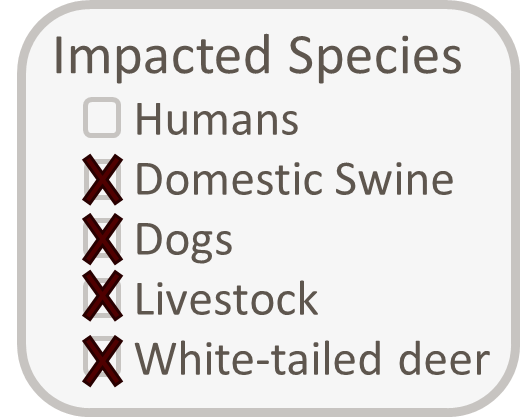Pseudorabies is a highly contagious, virally transmitted disease found in pigs. While it is not a form of rabies, it can cause neurological signs similar to those associated with rabies. Pseudorabies has limited effects on feral hogs, but can be fatal in other species. Humans are not affected by this disease, but it can be transmitted to other animals including cattle, sheep, goats, cats, dogs, and in rare cases, horses. Hog hunting dogs are at increased risk of becoming infected with this virus due to regular interaction with feral hogs and it is almost always fatal. To prevent infections in pets, do not feed uncooked feral hog meat or other by-products to dogs or cats. The virus can remain viable in the environment for up to two weeks depending on conditions and is typically transferred through nose-to-nose contact in commercial settings. In feral hogs, the disease can also be transmitted through inhalation, breeding, ingesting contaminated materials, or ingesting infected carcasses.

The creation of a vaccine for swine has allowed the disease to be eradicated from commercial swine operations in the United States, but it is still prevalent in feral hog populations. Every effort should be made to keep feral hogs away from domestic swine so that the virus is not re-introduced to domestic populations. Additionally, there are concerns about infected feral hogs transmitting the disease to other wildlife, especially scavengers and predators. There are documentations of infected wildlife around the world and in the United States, the range of PRV positive hogs overlaps with the ranges of the endangered Florida panther (individuals have tested positive for infection) and the recently de-listed Louisiana black bear.
